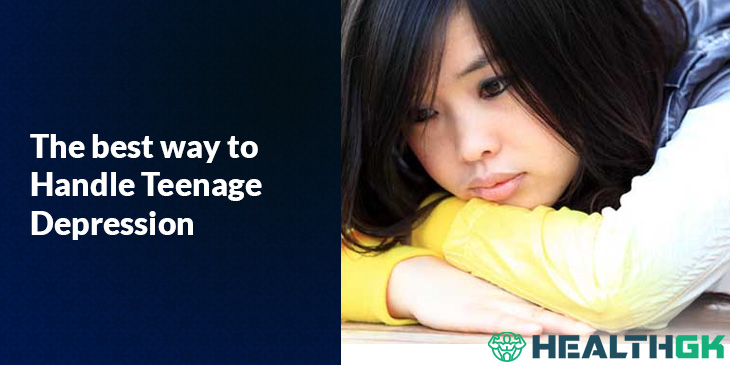
Discover the best strategies for dealing with teenage depression in this comprehensive guide. Learn how to support your teenagers and help them overcome challenges.
Adolescence can be a challenging phase marked by emotional turbulence, academic pressure, and social changes. It’s not uncommon for teenagers to experience moments of sadness and anxiety. However, when these feelings intensify and linger, it might indicate teenage depression. As caregivers and adults, it’s crucial to understand the best ways to handle teenage depression to provide the necessary support and guidance. In this guide, we’ll explore effective strategies, share personal insights, and provide expert advice to help teenagers navigate through these tough times.
The Best Way to Handle Teenage Depression
Teenagers are navigating a complex world filled with academic pressures, peer relationships, and personal identity development. The best way to handle teenage depression involves a multi-faceted approach that addresses their emotional, psychological, and social needs. Here are some key strategies to consider:
Creating a Supportive Environment at Home
Creating an open and supportive home environment is essential for teenagers struggling with depression. The best way to Handle Teenage Depression is to foster open communication without judgment. Encourage them to share their feelings and concerns, and actively listen to what they have to say. Offer reassurance and validation, showing that their emotions are valid and understood.
Encouraging Professional Help
When dealing with teenage depression, seeking professional help is crucial. A licensed therapist or counselor can provide the necessary guidance and support to help teenagers manage their emotions and develop healthy coping mechanisms. The best way to Handle Teenage Depression involves acknowledging that professional help is not a sign of weakness but a proactive step towards better mental health.
Promoting Physical Activity
Engaging in regular physical activity has been shown to have positive effects on mental health. Encourage your teenager to participate in sports, yoga, or any form of exercise they enjoy. Physical activity releases endorphins, which are natural mood lifters. The best way to Handle Teenage Depression includes incorporating exercise into their routine to promote a more positive outlook.
Fostering Healthy Friendships
Social connections play a significant role in a teenager’s life. Encourage your teenager to build and maintain healthy friendships. Positive peer interactions provide emotional support and a sense of belonging, reducing feelings of isolation. The best way to Handle Teenage Depression involves helping them understand the value of nurturing genuine relationships.
Teaching Stress Management Skills
Teenagers often face high levels of stress due to academic pressures and other responsibilities. Teaching them effective stress management skills can make a significant difference. The best way to Handle Teenage Depression includes techniques such as deep breathing, mindfulness, and time management to help them cope with stress in a healthy manner.
Identifying Signs of Depression
Being able to recognize the signs of teenage depression is crucial for early intervention. Look out for symptoms like persistent sadness, loss of interest in activities, changes in sleep patterns, and academic decline. The best way to Handle Teenage Depression is to stay observant and approach your teenager if you notice any concerning changes in their behavior.
Personal Insights: Navigating Teenage Depression
Having experienced teenage depression firsthand, I understand the challenges and struggles that adolescents face. During my teenage years, I often felt overwhelmed by academic expectations and the pressure to fit in socially. It was the unwavering support of my family, the guidance of a compassionate therapist, and the discovery of creative outlets that helped me overcome depression.
Frequently Asked Questions (FAQs)
Q: How do I know if my teenager is just going through a phase or dealing with depression?
A: It’s essential to pay attention to the duration and intensity of their emotions. If sadness or mood changes persist for more than two weeks and start affecting their daily life, it might indicate depression.
Q: Can talking to my teenager about their feelings make a difference?
A: Absolutely. Open communication shows them that you care and are there to support them. It can also help them feel less isolated and more understood.
Q: Is medication an option for treating teenage depression?
A: In some cases, medication might be recommended alongside therapy. It’s essential to consult a medical professional to determine the best course of action.
Q: How can I encourage my teenager to seek professional help?
A: Approach the conversation with empathy and without judgment. Express your concern and offer to help them find a therapist or counselor they feel comfortable with.
Q: Are there any online resources for teenagers dealing with depression?
A: Yes, many online platforms offer resources, support groups, and information about mental health. Ensure that the sources are credible and reputable.
Q: Can extracurricular activities help improve my teenager’s mood?
A: Yes, engaging in activities they enjoy can provide a sense of accomplishment and joy, which can contribute to improved mood.
Conclusion
Teenage depression is a serious matter that requires understanding, empathy, and proactive intervention. By creating a supportive environment, seeking professional help, promoting physical activity, fostering healthy friendships, teaching stress management skills, and identifying signs of depression, you can play a significant role in helping your teenager navigate through challenging times. Remember that The best way to Handle Teenage Depression involves a holistic approach that addresses their emotional, physical, and psychological well-being.
If you found this guide helpful, please consider sharing it with others who may benefit from it. Let’s work together to support teenagers in their journey towards better mental health.
Adolescent depression is not only the unpredictable rage or gloominess as well as bad moods – it is a serious issue that may have a lifelong effect if not recognized. Teen depression may cause alcohol and substance misuse, self-loathing, pregnancy, violence, and suicide.
Based on suicide.org, a teenager takes their very own life every 100 minutes. Suicide is the third-leading cause of death for young people ages 15 to 24 – Awful? The question we should ask here is – are we building up pressure instead of nurturing them for people who look up to us. Feeling stressed has practically become the standard for a lot of tensed and active urban families and this tension and tension gets transmitted to our kids – depression and adolescent pressure does not occur in a day it’s the consequence of a drawn-out youth that is distressed and troubled.
According to the Journal of the American Academy of Child and Adolescent Psychiatry – Depression in adolescence and childhood resembles adult major depressive disorder, although youthful sufferers may show increased or competitive and self destructive behavior, as opposed to the all encompassing despair and adult types of depression associated.
Never write your teens regular mood swings and fury off as hormonal issue or teen play, youthful heads may be delicate, when unexpectedly confronted with adult scenarios and however growing or peer pressure or social change many are unable to deal with this.
Some Hints to Be On The Lookout For:
- Regular irritable, cranky and unhappy demeanour
- Loss of interest in friends, sports or alternative normal tasks they adored
- Changes in appetite, substantial weight gain or loss.
- Deficiency or complete disinterest in studies or school tasks and abrupt drop of classes.
- Regular complaints about stomach aches or headaches
- Too much or too little sleep, withdrawal from all loved and close ones
- Writing or reading about passing, giving away favored possessions
Give Your Teenager the Top Start. We should provide our kids a great and safe beginning so they grow up to be holistically healthy people.
From an extremely tender age we have to support healthful eating habits and regular physical activity this helps the kid to attain and keep a great body and head equilibrium. Physical activity helps build a strong body and head. The mixture of great diet as well as physical activity results in clear thinking and dearth of pressure.
Take care the kid is getting a great sleep. Some research indicates that adolescents need more sleep than adults yet it is frequently true that they get less than they want. Slumber is vital that you enhance attention and alertness.
Lastly share the load, give your son or daughter a free environment to grow and flower. House ought to be a location where the children can take off their weights. Listen to kid from an extremely young age, spend quality time with your kid. Make her / him feel safe and adored at all costs- do not judge or compare. Remember that each child is unique – make every kid feel nicely emotionally and physically.




